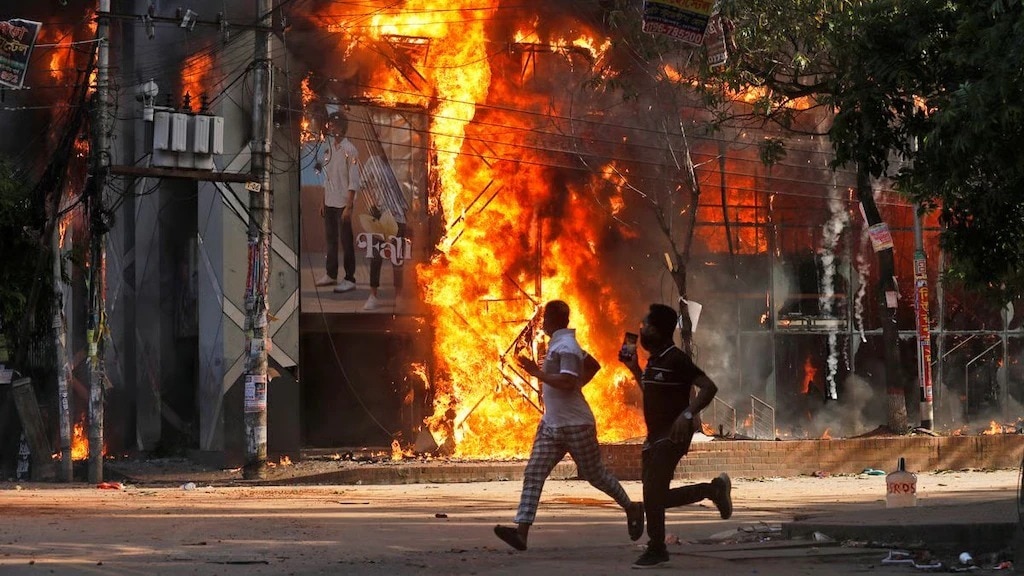This is the homeland of Muslims. There is no certainty about our lives here. If there is no certainty in our motherland, then where else on earth will there be any certainty… This is an episode from the controversial novel Lajja by popular Bangladeshi writer Taslima Nasreen.
Lajja is a novel published in 1993 by Bangladeshi writer Taslima Nasreen, which is based on the riots that took place in Bangladesh after the Babri Masjid demolition in 1992. This novel mentions the violence of Muslim fundamentalists on Hindu families. Due to which Hindu families were forced to leave the country amidst the riots.
But the violence-ridden Bangladesh of this novel, set 31 years ago, can be compared to the present Bangladesh. Just as the present Bangladesh was engulfed in the fire of violence after the coup of 5 August and Sheikh Hasina resigning from the post of Prime Minister and leaving the country, similarly, in 1992, after the demolition of Babri Masjid, Bangladesh was engulfed in the fire of riots, where minority Hindus were selectively targeted.
Taslima has mentioned the brutal form of communal frenzy in Bangladesh in her novel Lajja. She has tried to bring out the religious fanaticism. Now we need to pay attention to this phrase of the book:-
There was no security even in October 1990. The famous Dhakeshwari temple was set on fire, the police stood inactive and watched the spectacle. No action was taken. The main temple was burnt to ashes. Those people entered inside and destroyed the seats of the deities. Five shops of Hindus in front of Shankhari Bazaar were looted and vandalised and then burnt. Shila Vitan, Surma Traders, Salon and Tyre Shop, Meeta Marble, Saha Cabinet, nothing was spared from the fury of the rioters. The houses of 25 Hindu families were looted by a communal mob of 200 to 300. In Sutrapur, Hindu shops were looted and banners bearing the names of Muslims were put up on them. Nawabpur’s Ghosh and Sons’ sweet shop was looted and a banner of the Nawabpur Youth Union Club was put up on it.
At 10 pm on the night of November 1, 200 to 300 people came in a procession and looted the entire village. They took away whatever they could. Whatever they could not, they burnt it. There are heaps of ashes, burnt houses and rows of half-burnt trees everywhere. Paddy storage was set on fire. Nearly 4000 Hindu houses were damaged. 75% of the houses were burnt to ashes. Many women were raped. Temples were selectively targeted.
Have one or two Hindus, have breakfast in the morning and evening… This is the slogan of Islamic fundamentalists in the violence-torn Bangladesh of 1992, mentioned in the book, which describes the picture of present Bangladesh.
In Bangladesh, the anger of the students against the Sheikh Hasina government had shaken her government. Such violence broke out on the streets of Bangladesh including Dhaka, for which Hindus had to pay the price. Their houses, temples, properties were set on fire, after which a large number of Hindus want to leave Bangladesh and take refuge in India.
After Sheikh Hasina resigned, there were reports of attacks on Hindus and minorities at 278 places in 48 districts of Bangladesh. The Bangladesh Hindu-Buddhist-Christian Unity Council claimed that 205 cases of attacks on Hindus were reported in three days between August 5 and 8.
After Sheikh Hasina’s resignation, cases of attacks on Hindus have been reported from hundreds of places. ISKCON Temple and Durga Temples have been targeted. Houses and shops of Hindus have been vandalized. In Dinajpur, rioters also occupied a crematorium.
In such a situation, how is Bangladesh of 1992 different from Bangladesh of 2024 in Taslima Nasreen’s novel? Just as Hindus and their properties were selectively targeted in the violence that broke out in 1992, Hindus are being oppressed in the same way in the present times as well. They were burnt in the name of religion. Their properties were looted.
At one place in this novel, a voice comes from the inner conscience of the protagonist Suranjan, which says that We hear that Bangladesh is a country of communal harmony… these thoughts come Suranjan immediately starts laughing. Suranjan’s laughter is a sarcasm on the condition of Hindus in present-day Bangladesh.
Source (PTI) (NDTV) (HINDUSTANTIMES)
